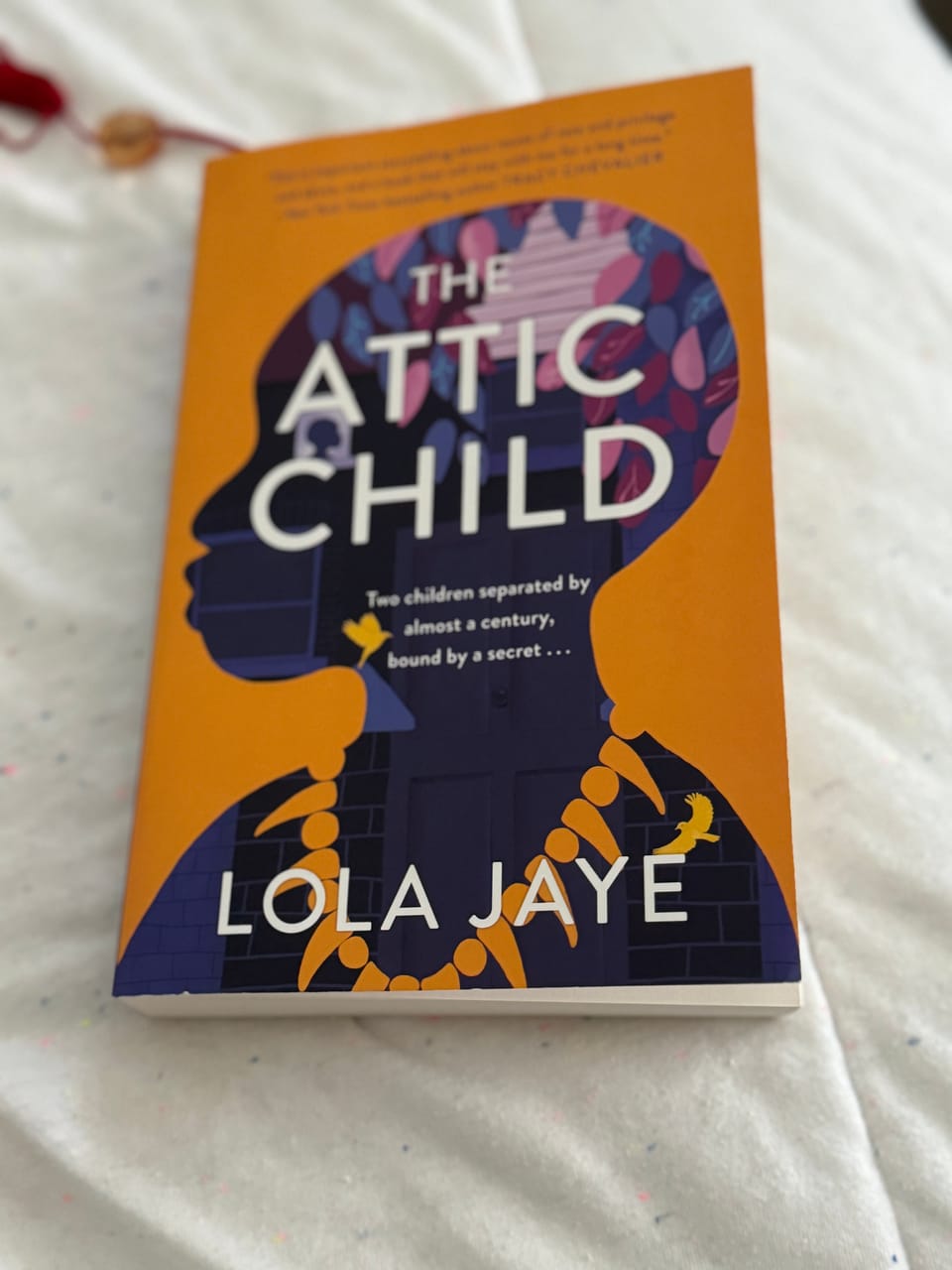The Attic Child by Lola Jaye

This novel follows Lowra, a young girl hidden away in an attic by her stepmother. This leads to a life of isolation and secrecy. As she grows older, she begins to question her stepmother's motives and, after inheriting the family home and seeing a picture of a young boy, seeks to uncover the truth about her past. In an alternative timeline, the novel follows Dikembe and his journey from a boy in Africa to a man in Britain. The story explores themes of family, identity, and the impact of secrets on one's life. The converging of the two timelines offers a haunting look at the effects of colonization, even for those who did not suffer what people deem as the worst horrors.
Where to Find Reviews
📚 Related Books
The books listed below are some that I read that can offer some fascinating history.
- The Color of Law
- In Search of Black History With Bonnie Greer
- Narrative of the Life of Frederick Douglass, an American Slave
- African Samurai: The True Story of Yasuke, a Legendary Black Warrior in Feudal Japan
- African Samurai
- How the Word Is Passed
- Never Caught: The Washingtons' Relentless Pursuit of Their Runaway Slave, Ona Judge
- Homegoing
🥰 Who Would Like It?
Fans of historical fiction, especially when a novel that explores themes of family secrets
Highlights and Notes
This, as well as a lot of what he explained, only served to confuse me. Especially as Sir Richard regularly pressed on me the importance of England being everything that was right about a country, and yet at the same time lent itself to so many outside influences. Indeed, wasn't Sir Richard by definition an explorer? If England was so great, then surely there would not be a need to explore … (Page 84)
And yet it was I, Dikembe, who had stood before the mirror that morning and not recognized myself; it was I, Dikembe, who was sitting in the grand room full of people, all eyes on me, yet feeling as it I were actually invisible. (Page 90)
I suddenly felt bound in chains that were invisible. The desperation to be released was strong and all-consuming. (Page 98)
"In my work, it's always been clear to me that history is on the side of the powerful and not the weak." (Page 162)
Monty still went back and forth over the notion of another Black person having possibly lived in or passed through Ranklin around 1908-1909 who could have been the father of Agatha's baby. A part of him refused to believe a woman capable of abusing a child sexually--and that's what this was. Celestine had been a child and she an adult. It was abuse. Not only locking Celestine away at her will and against his, she'd also taken whatever else she desired from him. (Page 339)
Once or twice I even spotted a couple of Black men. The three of us made eye contact in a way that spoke of a kinship not bound by blood, but a knowledge of a shared experience. (Page 344)
I knotted my hands together and listened as they sparred with words concerning this enigma, this real-life person. Having been so tied up with reading about great men from the past I was never actually going to meet, I'd failed to seek out the greatness happening around me. (Page 387)
"Like humans, trees tell a story. In nine months they can go from nakedness to half dressed, to fully flourishing bloom. Then they repeat the process all over again. I think they communicate a metaphor for life quite clearly." I nodded my head. "Nothing stays the same. We're in constant transition even when we are stagnant. So either you go with that or you get left behind. I just went with it." "We were kids, we had no choice," I said. "We didn't then, but I suppose now we do." (Page 426)
The idea came to me when Dikembe showed me a piece he'd been reading about one of his favorite writers, Chinua Achebe: Until the lions have their own historians, the history of the hunt will always glorify the hunter. The aim was always to record Dikembe's own story so that his place in history would be intact for centuries to come. Now Monty and I had come up with a way to make sure Dikembe would be the one to tell it. (Page 457)
🧠 Thoughts
While Reading
- Dekimbe was sent away by his mother with Sir Richard. He and I as the reader are confused about why. Lowra has been introduced.
- Seems like Lowra had an abusive stepmother.
- Dikembe is Sir Richard’s “good African.” In a sense he will be a “pet”. He will be paraded around to raise money. This books will take me on a wild journey of emotions.
- I really dislike Sir Richard.
- I also feel sadness for Dikembe. He misses his mama and is angry at her. Him having to gather all his love, memories and past to put in a mental box and close, is tough. I don’t want him to forget. It feels like his whole family was willing to sacrifice themselves so he could possibly live. That’s heartbreaking.
- Is Lowra black, mixed or white? She seems clueless when Monty makes comments about race. Also, what happened to her father? I wonder if we will learn about his death.
- I understand Monty’s frustration but he doesn’t try to understand that Lowra may have trauma. Do we as black people do this a lot? Do we make it seem like our generational trauma and individual trauma based on it trump individual trauma? I think historically black ppl have used our trauma to help shed light on others trauma. The miscommunication is irritating between Lowra and Monty.
- I hate Dikembe took on the shame and not Agatha. He was a child and she took advantage of him!
- I’m so happy Dikembe is alive!
- I have tears in my eyes.
- I’m so glad this book ended with happiness. So many times black trauma ends tragically but these characters loved even when pain could have overtaken them. They found joy.
Characters
- Lowra
- An orphan who is banished to the attic by her stepmother. She finds items in the attic that bring her comfort.
- Becomes invested in learning about the secrets her family home may hold
- looking for a connection
- Traumatized from her childhood, and we see the effects in her current life
- Monty
- historian who helps Lowra research the items she found
- Is invested in the research
- sometimes forgets that the "research" is tied to Lowra's family and identity
- Dikembe
- young boy who is sent away by his mother
- confused and angry
- Celestine
- young boy in the attic
- tragic but inspiring
- Sir Richard
- rich explorer
- loves Africa but views it and the people as an oddity
- I did not like this character or his actions
- His story wasn't tragic, but it should have been
- very similar outcome to those white men in history who are revered and their wrongdoings brushed over as a product of their time
Conflict
- Two distinct conflicts are running simultaneously throughout this book. The first is learning the secrets of the past to be able to move forward in life. The other is to keep surviving when the world seems to not recognize your humanity.
- The interesting aspect of this book is the seamless mix of internal and external conflict. One character is trying to find a connection and not let her past trauma dictate her future. Another character is trying to reconcile his seeming abandonment to a new world where he is deemed barbaric, but he sees the barbarism in the "gentleman" he encounters. A third character is determined not to let trauma and setbacks derail his belief that life is worth living. For all these characters, failing to overcome these conflicts can result in losing themselves.
Context
- The story takes place in two different timelines. The first starts in the early 1900s, while the other starts in the 1970s. The story does an excellent job of describing the setting and using the reader's assumed knowledge of history to fill in the gaps. It also does a really good job of capturing the characters' feelings and making the reader feel them. I do not cry often, but this book had me tearing up at multiple points.
Craft
- The story is easy to follow and understand. Although the start was slow, it picked up significantly. It suffers from some pacing issues, but I think some was necessary to understand the story. The weakest character in the book is Monty. He was not very developed. The romance between him and Lowra did not seem developed and seemed like an afterthought.
